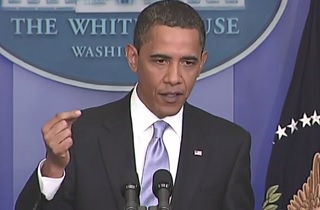President Obama ‘Tweaks’ His Message on ‘Keeping Your Plan’… in 2010
 In today’s edition of false mainstream media Obamacare narratives, political reporters are claiming that President Obama is only now “tweaking” his message that “if you like your plan, you can keep it” by qualifying the statement, as he did in a speech Monday night. However, the premise behind the whole “Obama lied, the uninsured no longer died, but who cares because David Frum has a higher premium” narrative is that the President knew that forces outside the health care law might cause people to lose coverage, but never told anyone.
In today’s edition of false mainstream media Obamacare narratives, political reporters are claiming that President Obama is only now “tweaking” his message that “if you like your plan, you can keep it” by qualifying the statement, as he did in a speech Monday night. However, the premise behind the whole “Obama lied, the uninsured no longer died, but who cares because David Frum has a higher premium” narrative is that the President knew that forces outside the health care law might cause people to lose coverage, but never told anyone.
CNN has been relentlessly reporting on the alleged “tweak” all morning, which on its own is a bit misleading, since the qualification the President offers is a self-evident one. If you liked your pre-Obamacare plan, but your insurance company makes significant changes to it, then it’s no longer the same plan. If the President said the same thing about, say, a leased automobile, then no one would think it strange that if Ford offered you a new lease, but the new car had no brakes, that would not qualify as the same car.
The media is in a bind here, because they can’t pretend they didn’t know about the grandfather clause, so they must instead pretend the President never told anyone that his pledge was only that the law wouldn’t make people change plans, until people started complaining about higher premiums (that, in almost every case, turned out to be lower premiums).
But on June 23, 2009, now-CNN anchor Jake Tapper (then with ABC News) asked President Obama about that pledge, and in a terrific demonstration of media narrative-building and goalpost-shifting, it was in the context of people possibly complaining about being put on a cheaper insurance plan, the then-still-breathing public option.
“It does seem logical to a lot of people that if the government is offering a cheaper health care plan, then lots of employers will want to have their employees covered by that cheaper plan, which will not have to be for profit, unlike private plans, and may possibly benefit from some government subsidies, who knows,” Tapper said. “And then their employees would be signed up for this public plan, which would violate what you’re promising the American people, that they will not have to change health care plans if they like the plan they have.”
After some good-natured joshing, the President explained the competitive pressure that a public option would apply to private insurance companies, and pointed out the new rules that would apply to companies in the individual health insurance market.
“I’m sorry,” Tapper said, “but what about keeping your promise to the American people that they won’t have to change plans even if employers…”
“Well, no, no, I mean — when I say if you have your plan and you like it and your doctor has a plan, or you have a doctor and you like your doctor that you don’t have to change plans, what I’m saying is the government is not going to make you change plans under health reform,” the President replied.
The government is not going to make you change plans under health reform. That’s pretty clear, and “tweak” or not, it is as true today as it was then. But maybe they’re just trying to sneak this “grandfather” technicality in at the last minute, and never really made clear that they considered a changed plan to be a different plan. Except, maybe, in this statement of administration policy from September of 2010 (emphasis mine):
The Interim Final Rule provides guidance that is essential for businesses, individuals, and issuers to determine when health coverage has changed to the point that it can no longer be regarded as the grandfathered plan in effect on the date of enactment. In specifying what changes can be made without the loss of grandfather status, the Interim Final Rule strikes a careful balance between the goals of the Affordable Care Act of providing new patient protections while minimizing disruption in existing markets. It achieves these goals by allowing businesses and health insurance issuers flexibility to make the kinds of normal adjustments they have historically made to contain costs and innovate. The Interim Final Rule ensures that if individuals or businesses choose to change their health coverage so significantly that it is no longer the coverage in place on March 23, the plan will need to provide additional consumer protections required by the Affordable Care Act, such as preventive health benefits without out-of-pocket costs and the right to independent appeals of health plan coverage determinations and claims. Moreover, the regulators are considering potential specific improvements to and clarifications of the Interim Final Rule in order to be responsive to stakeholders’ comments on particular aspects of the rule while continuing to meet issuers’, employers’ and families’ needs for clear guidance.
Those rules clearly set out what insurance plans are allowed to do while still keeping their grandfather status, including jacking up deductibles and copayments by more than 15% a year. Years later, it is possible for news organizations to discuss whether those rules are too strict, but they can’t pretend they didn’t know about them, or didn’t understand what they meant. Well, they can do that, but they shouldn’t. Maybe they should ask that Jake Tapper fellow about it, he seems to be pretty sharp.
This is an opinion piece. The views expressed in this article are those of just the author.
New: The Mediaite One-Sheet "Newsletter of Newsletters"
Your daily summary and analysis of what the many, many media newsletters are saying and reporting. Subscribe now!






Comments
↓ Scroll down for comments ↓